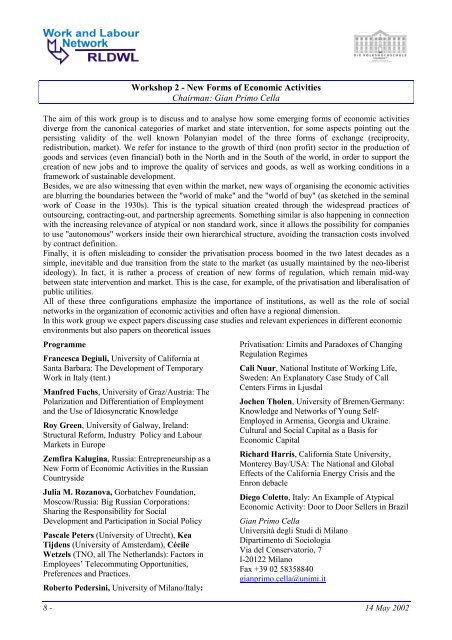"Labour, Globalisation and The New Economy" - rldwl
"Labour, Globalisation and The New Economy" - rldwl
"Labour, Globalisation and The New Economy" - rldwl
You also want an ePaper? Increase the reach of your titles
YUMPU automatically turns print PDFs into web optimized ePapers that Google loves.
Workshop 2 - <strong>New</strong> Forms of Economic Activities<br />
Chairman: Gian Primo Cella<br />
<strong>The</strong> aim of this work group is to discuss <strong>and</strong> to analyse how some emerging forms of economic activities<br />
diverge from the canonical categories of market <strong>and</strong> state intervention, for some aspects pointing out the<br />
persisting validity of the well known Polanyian model of the three forms of exchange (reciprocity,<br />
redistribution, market). We refer for instance to the growth of third (non profit) sector in the production of<br />
goods <strong>and</strong> services (even financial) both in the North <strong>and</strong> in the South of the world, in order to support the<br />
creation of new jobs <strong>and</strong> to improve the quality of services <strong>and</strong> goods, as well as working conditions in a<br />
framework of sustainable development.<br />
Besides, we are also witnessing that even within the market, new ways of organising the economic activities<br />
are blurring the boundaries between the "world of make" <strong>and</strong> the "world of buy" (as sketched in the seminal<br />
work of Coase in the 1930s). This is the typical situation created through the widespread practices of<br />
outsourcing, contracting-out, <strong>and</strong> partnership agreements. Something similar is also happening in connection<br />
with the increasing relevance of atypical or non st<strong>and</strong>ard work, since it allows the possibility for companies<br />
to use "autonomous" workers inside their own hierarchical structure, avoiding the transaction costs involved<br />
by contract definition.<br />
Finally, it is often misleading to consider the privatisation process boomed in the two latest decades as a<br />
simple, inevitable <strong>and</strong> due transition from the state to the market (as usually maintained by the neo-liberist<br />
ideology). In fact, it is rather a process of creation of new forms of regulation, which remain mid-way<br />
between state intervention <strong>and</strong> market. This is the case, for example, of the privatisation <strong>and</strong> liberalisation of<br />
public utilities.<br />
All of these three configurations emphasize the importance of institutions, as well as the role of social<br />
networks in the organization of economic activities <strong>and</strong> often have a regional dimension.<br />
In this work group we expect papers discussing case studies <strong>and</strong> relevant experiences in different economic<br />
environments but also papers on theoretical issues<br />
Programme<br />
Francesca Degiuli, University of California at<br />
Santa Barbara: <strong>The</strong> Development of Temporary<br />
Work in Italy (tent.)<br />
Manfred Fuchs, University of Graz/Austria: <strong>The</strong><br />
Polarization <strong>and</strong> Differentiation of Employment<br />
<strong>and</strong> the Use of Idiosyncratic Knowledge<br />
Roy Green, University of Galway, Irel<strong>and</strong>:<br />
Structural Reform, Industry Policy <strong>and</strong> <strong>Labour</strong><br />
Markets in Europe<br />
Zemfira Kalugina, Russia: Entrepreneurship as a<br />
<strong>New</strong> Form of Economic Activities in the Russian<br />
Countryside<br />
Julia M. Rozanova, Gorbatchev Foundation,<br />
Moscow/Russia: Big Russian Corporations:<br />
Sharing the Responsibility for Social<br />
Development <strong>and</strong> Participation in Social Policy<br />
Pascale Peters (University of Utrecht), Kea<br />
Tijdens (University of Amsterdam), Cécile<br />
Wetzels (TNO, all <strong>The</strong> Netherl<strong>and</strong>s): Factors in<br />
Employees’ Telecommuting Opportunities,<br />
Preferences <strong>and</strong> Practices.<br />
Roberto Pedersini, University of Milano/Italy:<br />
Privatisation: Limits <strong>and</strong> Paradoxes of Changing<br />
Regulation Regimes<br />
Cali Nuur, National Institute of Working Life,<br />
Sweden: An Explanatory Case Study of Call<br />
Centers Firms in Ljusdal<br />
Jochen Tholen, University of Bremen/Germany:<br />
Knowledge <strong>and</strong> Networks of Young Self-<br />
Employed in Armenia, Georgia <strong>and</strong> Ukraine.<br />
Cultural <strong>and</strong> Social Capital as a Basis for<br />
Economic Capital<br />
Richard Harris, California State University,<br />
Monterey Bay/USA: <strong>The</strong> National <strong>and</strong> Global<br />
Effects of the California Energy Crisis <strong>and</strong> the<br />
Enron debacle<br />
Diego Coletto, Italy: An Example of Atypical<br />
Economic Activity: Door to Door Sellers in Brazil<br />
Gian Primo Cella<br />
Università degli Studi di Milano<br />
Dipartimento di Sociologia<br />
Via del Conservatorio, 7<br />
I-20122 Milano<br />
Fax +39 02 58358840<br />
gianprimo.cella@unimi.it<br />
8 - 14 May 2002


